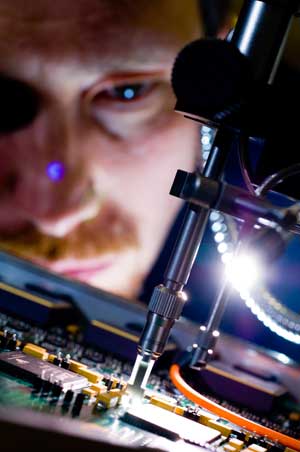Electronics Engineer
Tasks & duties

Electronics engineers:
-
design electronic circuits, components, equipment and computer programs
-
supervise production
-
research information and problems to do with electronics
-
advise on manufacturing materials and costs
-
investigate and test new electronics components and equipment
-
present reports and proposals
-
modify and service electronic equipment they have designed
Skills & knowledge
Electronics engineers need to have:
-
knowledge of physics, mechanics, electronics, maths and computers.
-
knowledge of new methods and technology in the electronics industry
-
design skills
-
good written and oral communication skills
-
skill in interpreting drawings
-
problem-solving skills
-
decision-making ability
Entry requirements
To become an electronics engineer you need a Bachelor of Engineering or a Bachelor of Technology. However a Diploma in Engineering (replacing the New Zealand Certificate in Engineering) or an equivalent diploma may also be acceptable. A Bachelor of Science in Software Engineering is useful if you want to specialise in programming computer software for electronics.
Secondary education
A tertiary entrance qualification is needed to enter further training. Useful subjects include maths with calculus, maths with statistics, technology and science subjects.
Tertiary education
A Bachelor of Engineering or a Bachelor of Technology is normally required. A Bachelor of Science in Software Engineering is also useful if you want to specialise in programming computer software for electronics.
Training on the job
Skills are gained on the job, and electronics engineers may attend courses, seminars, workshops and conferences to keep their skills up to date.
Registration
Electronics engineers may apply to the Institution of Professional Engineers New Zealand (IPENZ) to become a chartered professional engineer (CPEng) once they have completed work experience (usually four to five years) and a practical competency assessment.
To maintain registration chartered engineers must show that they are competent to practise at least every five years and display evidence of undertaking professional development.
Useful experience
Experience working with electronics is preferred by most employers. Other useful experience includes:
-
design work
-
work as a technician
-
experience testing equipment
-
work with computers
-
work experience in a production environment
Related courses
Communications Equipment Installation and Maintenance
Electronic Engineering
Electronic Equipment Servicing
For more information, please refer to Career Services.
Document Actions
